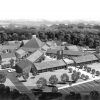calsfoundation@cals.org
Eugene John Weibel (1853–1934)
aka: Johann Eugen Weibel
A Swiss-German Catholic priest and missionary, Father Eugene John Weibel founded so many churches and other ecclesiastical institutions that he has been termed the Catholic “Apostle to northeastern Arkansas.”
Eugene Weibel was born on May 27, 1853, in the small town of Eschenbach, Canton Lucerne, Switzerland. (His name appears as Johann Eugen Weibel in some German-language sources.) In Weibel’s autobiography, he failed to mention his birth mother’s name, only that she died at age thirty-three, four weeks after his birth; his father, John Baptist Weibel, remarried when Eugene was two. Although he mentions that there were eleven children in the family, he does not indicate where in that order he arrived. After attending Catholic elementary school in his village and a high school four miles away in Rothenburg, he began his college studies at a Benedictine monastery at Einsiedeln in 1869. After his beloved stepmother, Katherine Halter Weibel, died in 1870, Weibel entered the Benedictine Abbey of Maria Stein near his home in 1871.
Weibel was ordained a priest in the Benedictine Order on August 15, 1876; he said his first Mass at his parish church in Eschenbach. Yet Weibel felt called to the mission field, and this meant the United States. By December 1878, he was at St. Meinrad’s Benedictine Abbey in Indiana. He did not stay there long; after hearing that the abbey had just started a mission priory in March 1878 in Logan County, Arkansas, the young monk asked to be sent to this new endeavor.
Fr. Weibel made it to St. Benedict’s in Logan County in February 1879. Two months later, Arkansas’s Catholic Bishop Edward M. Fitzgerald asked him to go to Pocahontas (Randolph County). Weibel took months deciding, but he stepped off the train in O’Kean—the nearest railroad stop to Pocahontas—on December 1, 1879, to begin almost thirty years of ministry in northeast Arkansas. He was now no longer a monk in the Benedictine Order but a priest serving the Catholic Diocese of Little Rock.
Fr. Weibel rightly deserves the title of Catholic Apostle to this quadrant of the state. He established churches, convents, schools, and St. Bernards Medical Center in Jonesboro (Craighead County) in 1900; this industrious missionary also founded parishes in Paragould (Greene County), Hoxie (Lawrence County), Engelberg (Randolph County), Walnut Ridge (Lawrence County), and Corning (Clay County). He brought an order of sisters to Pocahontas in 1887; in 1893, it aligned with a Swiss-based Benedictine Sisters of Mount Olive or Olivetan Benedictines, a women’s religious order begun in the 1300s. He had convents constructed for these sisters first in Pocahontas, and later in Jonesboro, which is still their motherhouse.
Writing to the Vienna, Austria–based Leopoldine Society on November 30, 1898, Fr. Weibel reported that when he first arrived in Pocahontas, there were only eighteen Catholics in the town and no other priest for 150 miles. In less than twenty years, he had built fifteen churches and chapels, seven schools, and five convents. Seven priests and sixty sisters were now serving an area he once covered alone. Small in stature with a full beard, this frugal and determined priest opened schools for African Americans despite strong opposition from some white locals. While Fr. Weibel maintained that he hated to beg, he also reported that when a small child in Paragould swallowed a coin, a child nearby spontaneously exclaimed, “Call Father Weibel. He can get money out of anyone.”
In 1908, he left Jonesboro and northeast Arkansas for a new assignment, founding a church and school, St. John the Baptist, in Hot Springs (Garland County). On August 15, 1917, forty-one years to the day after he was ordained, he resigned to become the chaplain at St. Joseph’s Hospital and at the Convent of the Good Shepherd, both in Hot Springs. In 1919, he began writing his account of his years in Arkansas, later titled, Forty Years Missionary in Arkansas. By 1922, he returned to Europe, serving as a prison minister in Lucerne, Switzerland. He made a brief return to Arkansas in 1926, as this was the fifty-year jubilee of his ordination, and it was celebrated appropriately in Pocahontas, his first Arkansas assignment, on August 31. By September 23, he was on route to Europe, never to return.
The next year, he published in German his account of his Arkansas career. He died on March 3, 1934, at the Benedictine monastery in Einsiedeln.
For additional information:
Archives of the Diocese of Little Rock. St. John’s Catholic Center, Little Rock.
Dew, Lee A. “Founding of the Catholic Parish of Jonesboro.” Craighead County Historical Quarterly 6 (Spring 1968): 14–21.
Leopoldine Collection. University of Notre Dame Archives. Hesburgh Library. University of Notre Dame, South Bend, Indiana.
Weibel, John E. The Catholic Missions of North-east Arkansas, 1867–1893. Jonesboro: Arkansas State University Press, 1967.
———. Forty Years Missionary in Arkansas. Jonesboro: Holy Angels Convent, 1968.
Woods, James M. Mission and Memory: A History of the Catholic Church in Arkansas. Little Rock: August House Publishing Company, 1993.
James M. Woods
Georgia Southern University








Comments
No comments on this entry yet.